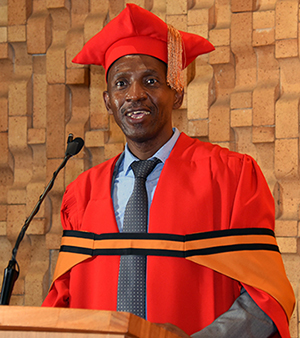College of Human Sciences
Driven to break language barriers in higher education

Prof Stanley Madonsela
According to Prof Stanley Madonsela, Unisa's Chair of the Department of African Languages, incorporating African languages in teaching and learning is tied intrinsically to a sense of belonging linked to society and its values. Furthermore, Madonsela argues that African languages are crucial in the educational development of students. He elaborates: "Teaching in African languages is critical; it helps students to grasp concepts and the content better with a possibility of an improved throughput rate and supports their success later in life."
Madonsela reiterates that if students do not understand the teaching and learning language, the process can be compromised. "Additionally, incorporating African languages in teaching and learning has the benefit of reducing anxiety, contributes towards the socio-psychological development of students and provides better epistemological access to learning content," affirms Madonsela.
Unisa promotes indigenous languages in its curriculum
Unisa's Department of African Languages has a mandate to promote and develop the use of African languages. The department works in collaboration with its strategic partners in the African languages space and in accordance with the national Constitution and international vision for developing and using African languages. Further, it offers a wide range of quality learning programmes in African languages up to doctoral level to learners and scholars within and beyond the South African borders.
Madonsela explains that the department embraces indigenous languages with its firm belief that social cohesion and multilingualism, which are enshrined in the African philosophy (Ubuntu), can be better achieved when language barriers are broken in the higher education learning space. "The department identifies and pursues new niche areas in line with the institution's vision of being the African university shaping futures in the service of humanity," says Madonsela.
He remarks: "As part of our community engagement programme, the department is reaching out to schools to provide academic expertise in line with the university's vision, maintaining and enhancing Unisa's acknowledged academic stature." Madonsela continues: "Through the Language Policy under review, the university continues to progress, but resolutely, develop African languages as languages of science, technology and innovation, to be employed in teaching, learning and research." The roll-out of Short Learning Programmes in African languages is another initiative the department uses to promote African languages.
Unmatched track record
Unisa has, and continues to produce graduates who studied their qualifications in African languages. Dr Justice Kobue Legodi was the first Unisa student to obtain a PhD in Setswana. Legodi's foci were indigenous knowledge and its significance and customs; how these are transferred to the next generation; and the scientific and psychological knowledge of the Batswana people.
Veteran actress, Dr Regina Nesengani of South Africa's vernacular popular SABC 2 soapie Muvhango, wrote her dissertation in Tshivenda and graduated with a PhD in 2020. Focusing on gender-based violence, Nesengani wrote about women abuse through dialogue in drama books written by male writers.
Legendary South African sports broadcaster, Zama "ZZ" Masondo graduated cum laude with a Master of Arts in African Languages. Masondo was admitted through Unisa's Recognition of Prior Learning process and was supervised by Madonsela. Masondo is also known for his vast experience in the language and development sector as a sports commentator and for his contribution to coining many soccer terms and phrases in isiZulu.
However, Madonsela maintains that as much as South Africa's new Language in Education Policy has been rated and described as one of the most progressive in the world, the lack of clear implementation strategies hinders the advancement of African languages in the education system. He states: "The lack of integration of information technology systems on African languages' works also poses a risk. This is amid plagiarism becoming a well-known and growing issue in the academic world.” Madonsela concludes by urging institutions to address the research problem gap between policy goals and what is happening in institutions of learning.
* By Nancy Legodi, Acting Journalist, Department of Institutional Advancement
Publish date: 2022/09/26

 Unisa co-hosts G20 community outreach in the Eastern Cape
Unisa co-hosts G20 community outreach in the Eastern Cape
 Unisans gain membership of prestigious science academies
Unisans gain membership of prestigious science academies
 Advocating for disability transformation through servant leadership
Advocating for disability transformation through servant leadership
 Unisa Press continues to illuminate the publishing space
Unisa Press continues to illuminate the publishing space